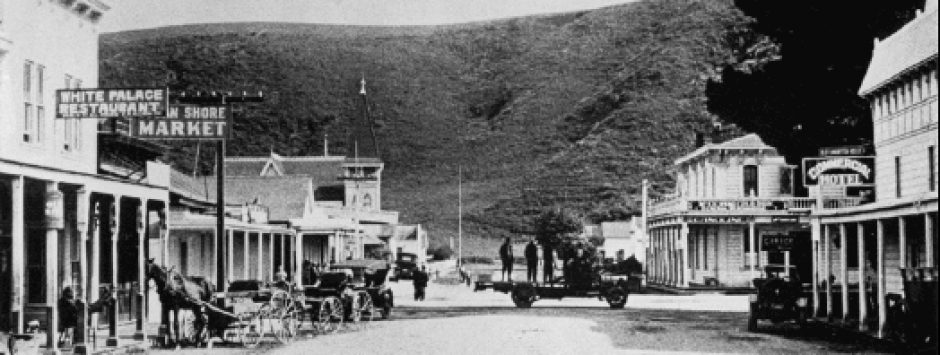Note: The San Mateo County History Museum located in the Old Courthouse in Redwood City has many vintage photos of the Levy Brothers as well as documentation.
An old-new story by June Morrall
The “Classic” Story of the Levy Brothers
(Time: Late-ish 19th century)
Before help arrived to squelch the hot flames, an out-of-control blaze had engulfed Charles Kelly and Richard Mattingly’s” General Store in Half Moon Bay. The fire spread to engulf nearby M.E. Joyce’s Saloon, and eyewitnesses sadly predicted that they would lose one of the only places to shop for supplies.
Without an official fire department, the town’s citizens formed bucket brigades, perhaps scooping up the cool water from Pilarcitos Creek where the famous concrete bridge built in 1900 welcomes visitors into town today.
As the fire burned itself out, you can imagine how store owner Charles Kelly, described “as a power in local politics,” felt staring at the remains, a charred shape of black rip rap. But on that terrible day both he and partner Richard Mattingly said they were going to rebuild an even bigger building, two stories, 25-feet wide, with the ground floor leased to Wells Fargo Express, the post office and recently installed telegraph services from San Mateo-Half Moon Bay and Pescadero—but then 12 months later the owners threw in the towel, and put the store up for sale.
Through friends, two young brothers, Fernand and Joe Levy, recently arrived from France, learned about the business for sale and snapped it up. I don’t know where they were living at the time but it was Fernand and Joe’s dream to own a store in a small town. They came to see Kelly and Mattingly’s business in 1872, a year when there was lots of loose talk of railroads connecting the Coastside to the buzzing city of San Francisco.
Had any of these plans come to fruition, Half Moon Bay would have been the economic winner, selling wood from local sawmills for the construction of new homes in the growing city to the north. The Coastside’s vegetables, famous for their freshness and “enormous size” would have filled the marketplace.
I’m sure that Joe and Fernand were highly aware of the possibility of a railroad, any railroad, and like other ambitious businessmen, believed it was going to happen. With little thought of the reverse, that is, no railroad, the Levys purchased Kelly and Mattingly’s business.
Both Levys possessed pleasant personalities and were easy to be around. From the moment they opened the new doors, the brothers stocked a variety of merchandise and groceries, “intended to startle the natives,” according to a newspaper report.
In front, on the street, there was a display of the latest plows and mowing “machines,” and inside the dry goods included clothing—a genuine general store, said to be one of the first of many business ventures launched on the Coastside.
[Part II to follow]
